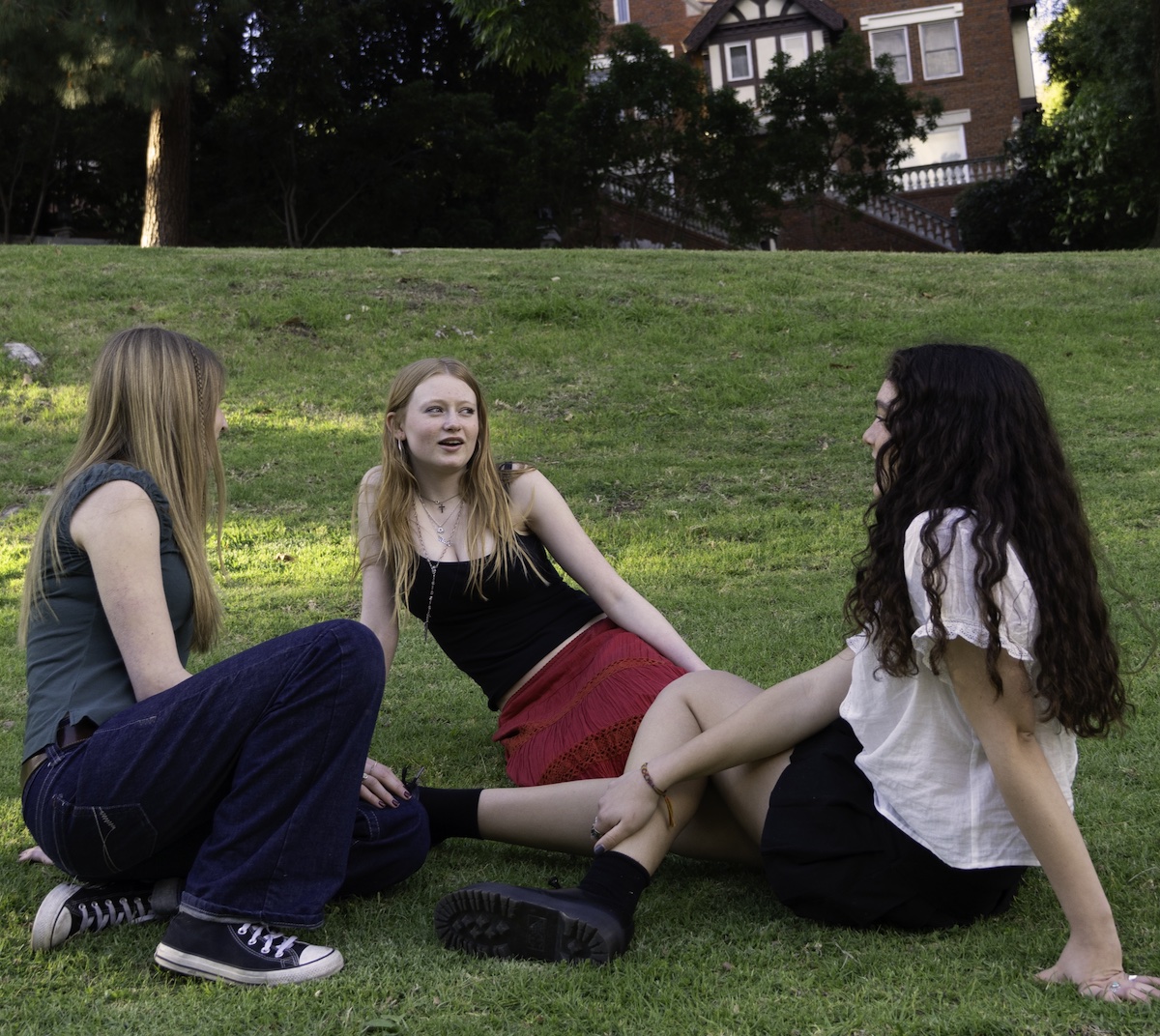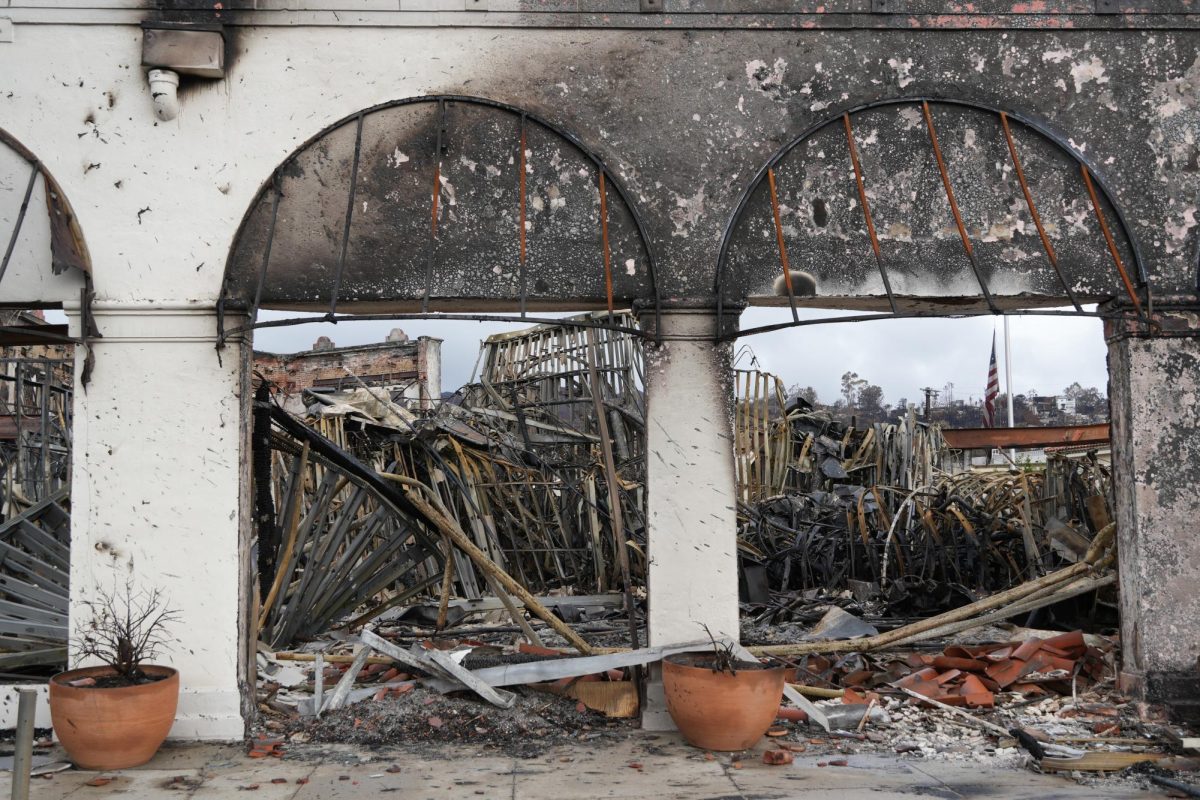
By Leora ’15, Evelyn ’17, Baxter ’16
In fall of 2012, the Performing Arts Department performed the All-School Musical Avenue Q, a musical that uses puppets to convey issues such as racism and sexuality. During one rehearsal leading up to the production, Performing Arts Department Head Anne Scarbrough and drama instructor Gleason Bauer, who direct the all-school productions, facilitated a discussion with the cast about the meaning of racism to the girls in the play. Many members of the school community recall that the directness with which the play addressed controversial topics surprised many audience members but encouraged dialogue about seemingly taboo issues.
Avenue Q is illustrative of the efforts of the School’s Performing Arts Department to raise questions about social issues through its productions.
“The performing arts have the potential to be a really meaningful place for dialogue to begin and to act as a catalyst for things that are happening inside of a community,” Bauer said.
Members of the School community outside of the theater department remarked on the thought-provoking themes in the productions, but many regretted that the discussions often do not continue after leaving the theater. In turn, the theater department aims to improve its ability to encourage long lasting conversations about the topics presented in productions.
How does the department select the productions that it puts on? How do the directors and cast encourage dialogue about social issues? To what extent do the questions raised ultimately resonate with the community?
SELECTING SCRIPTS
In choosing productions, the theater department seeks to evoke questions and dialogue surrounding social issues while considering whether a production’s message is appropriate for the audience’s diverse maturity levels. Students and teachers in the Performing Arts Department both agree that theater is a powerful art form because it offers up the possibility for valuable discussion in the context of a safe environment. While this dialogue may at times be uncomfortable or controversial for both the actors and the audience, many agree it is nevertheless vital to an engaged, active and thriving community.
Over the years, Marlborough productions have raised questions about sexism, gender roles, racism and identity. These topics generally coincide with prominent cultural discussions occurring at the time of the play’s development and production.
Bauer explained that one of the most important aspects of the decision process is the selection and portrayal of a central issue.
“One of my main priorities in choosing a play is making sure that it’s relevant to whatever seems to be happening inside our own community and the larger culture,” Bauer explained.
For example, Scarbrough recalls that, when the department put on Macbeth in 2008, the conversations surrounding the presidential elections and the role of the media at the time were large factors in the selection of the play. In Marlborough’s production, the Weird Sisters represented members of the media, and their prophecies were symbolic of polling predictions. Scarbrough was able to incorporate a broader cultural discourse about the role of politics in society into the Shakespeare play.
In this year’s production of Into the Woods, Bauer and Scarbrough made several alterations to the script created by Stephen Sondheim and James Lapine. They modified the role of the narrator to be two children, as opposed to the traditional part of a grown man. The directors also encouraged Gracie ’17, who plays Cinderella, to consider that her character may be questioning her sexuality.
Those involved in the play said they hope that the discussions about social themes continue after the production.
“The theater program wants to spark conversations rather than give an answer; they’re all about giving you new ideas and different ways to see things,” Drama Ensemble member Avery ’17 said.
Assistant Head of School and Head of Upper School Laura Hotchkiss ’86 cites a challenge in finding the balance between taking on an important cultural issue while being appropriate for young girls, alumnae, parents and grandparents alike.
“It’s hard to find a piece that can challenge the more mature audience goers but be appropriate for the younger audience goers as well,” Hotchkiss said.
The Performing Arts Department and the administration collaborate to select each school play and musical. While Bauer and Scarbrough direct school productions, Hotchkiss, Head of School Barbara Wagner, and Head of Middle School Robert Bryan are also involved in the selection process.
To begin, Scarbrough provides the administration with several possible plays, including the rationale behind each selection and the ways in which each relates to the different goals the department has for the year. According to Hotchkiss, the group tries to come to a consensus and choose a theme that is appropriate for a broad audience.
SPOTLIGHT ON SOCIAL ISSUES
The Performing Arts Department devotes rehearsal time to educating the cast about the issues raised in productions and uses lines, songs, characters and moments in each play it presents to evoke questions. The casts’ conversations allow the actors to incorporate their knowledge and basic understanding of the topics into their portrayals of their characters.
Caroline Sanford ’14, who acted in Marlborough productions each year from 7th to 12th grade, appreciates the effort the theater department puts into allowing the cast members to learn about often controversial issues like sexuality, race and gender because she did not often discuss the topics elsewhere in the School community. Sanford recalls that at one of the first rehearsals for Avenue Q in 2012, the cast sat down and discussed race for at least three hours.
“That was a special gift [the theater department] gave us…I still use that vocabulary I learned, and we discussed how to talk about race without making other people feel like you’re disrespecting them,” Sanford said.
Geraghty said that the plays do a good job of being sensitive to certain issues but also manage to inspire public debate and promote discussions.
“One song in Avenue Q was called ‘Everyone’s a Little Bit Racist,’ and that is a funny song that makes you laugh, but it’s almost like an embarrassed laugh because they are pointing out how different groups are racist towards each other,” Geraghty said.
Geraghty also values the overall artistry and visual enjoyment she receives from a play, believing that an effective play does not hit the audience over the head with a message and is still entertaining.
Drama Ensemble member Sarah ‘16 values that social issues tie into the shows at Marlborough and sees value in the dialogue that will arise from Into the Woods.
“I think that some of the messages or questions that [Into the Woods] raises [are] what goes into telling a story, how you can justify a lie, how far can lying get you… I think it’s those types of questions that make people’s parts and make the play real for people,” Sarah said.
Although most of the Performing Arts Department’s productions have encouraged questions and conversation about social issues, not all have succeeded. Sanford recalls that Bauer had hoped to raise conversation about racism by setting the School’s 2011 production of A Midsummer Night’s Dream in the South after the Civil War and almost included an older, professional, black actress, Patrice Quinn. However, Bauer decided not to include Quinn in the production days before the play. Sanford said that this potentially controversial dialogue about slavery was never raised.
HOW ARE THEY RECEIVED?
Audience members generally appreciate that the Performing Arts Department integrates questions about society into the entertainment of the play itself. Hotchkiss said that student actors have successfully encouraged reflection about social issues through the plays.
“I think they’ve done a fantastic job of digging in deep into what the themes are and what the controversies are and what the challenging parts are of any play or musical they’ve done,” Hotchkiss said.
Even mature audience members, however, are occasionally shocked by plays’ content. In 2012, the Performing Arts Department performed The Dark of the Moon, which included a religious revival in which an actor spoke in tongues and collapsed before reawakening.
“I was sitting there thinking [about] how many people in the audience are feeling uncomfortable. It wasn’t that I was so uncomfortable. It was that I knew, had my mother been there, she would have been offended. But then again we are in California not in South Carolina, where life is very, very different. The views of people are very, very different,” Mirick said. She said that she values boundary pushing in plays, yet she added that the audience members might appreciate being informed ahead of time about possibly controversial or offensive topics.
Sometimes, elements of a production that have less to do with its meaning catch the audience’s attention, like the kissing scene in A Midsummer Night’s Dream or the sex scene in the School’s 2010 production of the musical Chicago.
“As a seventh grader, I was a tad unnerved by the sex scene, but I think they did it tastefully, and I was really proud of Marlborough for stepping outside the box,” said Claire ’16.
Student actors said that they hope that any discomfort with provocative dialogue or scenes in a production leads to reflection by audience members about current issues. Both Scarbrough and the actors agree that a lot of conversation exists within the drama community, but are not sure how much conversation occurs among viewers.
Scarbrough and Bauer have established talkbacks at the end of each production to increase discussion between the cast and the audience. Scarbrough said that she thinks they are potentially valuable in transferring the conversation from the cast of the play to the community.
“Having a safe place to talk about some of the difficult issues in the world is one of the things I think that art can provide. You don’t have to talk specifically about our problem, you get to talk about it in the hypothetical realm of…this fiction you just witnessed,” Scarbrough said.










